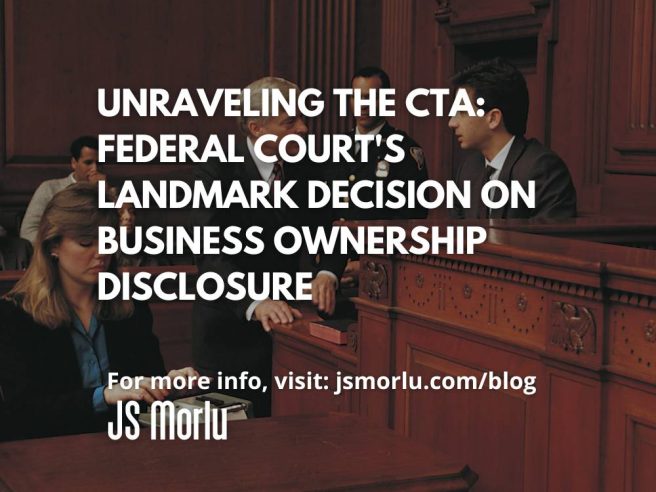The fight against money laundering took an unexpected turn on March 1, 2024, when a federal district court in Alabama declared the Corporate Transparency Act (CTA) unconstitutional. This decision, a victory for some and a concern for others, has sent shockwaves through the legal and business communities. Let’s delve deeper into the CTA, the court’s reasoning, and the potential consequences of this landmark ruling.
Shining a Light on Business Ownership: The CTA’s Objectives
Enacted in 2021, the CTA aimed to increase transparency in corporate ownership by requiring businesses like corporations and LLCs to disclose information about their “beneficial owners.” These are the individuals who ultimately control or profit from the business, even if their names don’t appear on official documents. This disclosure, encompassing details like full legal names, addresses, and tax IDs, was designed to make it harder for money launderers and criminals to hide behind anonymous shell companies.
However, the path to transparency hit a roadblock in the Alabama courtroom. Judge Liles C. Burke, presiding over the case, ruled that the CTA overstepped its bounds. While acknowledging the noble intentions of combating financial crime, the court argued that the methods employed by the act were overly broad. The judge pointed out that the CTA targeted millions of businesses and their stakeholders solely based on their corporate structure, lacking a clear connection to the government’s power to regulate such entities. In simpler terms, the court felt the CTA imposed excessive federal oversight and reporting burdens on businesses.
The Government’s Case: Justifying the Means?
The government defended the CTA by citing various powers granted by the Constitution. They argued their authority stemmed from:
- Foreign Affairs: The CTA could help prevent money laundering activities that could threaten national security.
- Commerce Clause: The act could regulate businesses involved in interstate commerce, a key power of Congress.
- Taxing Power: Disclosing beneficial ownership could aid in tax collection efforts.
However, the court remained unconvinced. It deemed the CTA’s approach as an unnecessary and improper way to achieve the intended goals within the scope of these powers.
The Fallout: Relief for Businesses, Uncertainty for the Future
The court’s decision carries significant weight. The CTA had proposed harsh penalties for non-compliance, including hefty fines and potential imprisonment. The judge highlighted these “severe” measures, emphasizing that penalties should only apply to individuals who intentionally flout the law, not the businesses themselves.
This ruling brings relief to a vast swathe of American businesses. Estimates suggest the BOI reporting requirements would have impacted over 32 million entities, with millions more added each year. The court’s decision not only challenges the government’s anti-money laundering strategy but also lifts a substantial regulatory and financial burden from businesses across the nation.
Divided Opinions: Victories and Concerns
The verdict has been met with mixed reactions. Critics of the CTA, particularly small businesses who felt unfairly targeted, hail the decision as a win. They see it as a check on government overreach and a protection of their rights. The National Small Business Association (NSBA), a key plaintiff in the case, is a vocal supporter of the ruling.
On the other hand, advocates for the CTA express concerns. They fear the decision might impede efforts to crack down on financial crimes and decrease transparency in the business sector.
The Road Ahead: Appeals, Uncertainty, and Potential Changes
This ruling is not a blanket ban on BOI reporting. It only applies to the plaintiffs in this specific case, meaning the CTA remains in effect for others (with specific deadlines for reporting). However, the broader impact on federal regulatory power and anti-money laundering efforts remains unclear.
The government is likely to appeal the decision, potentially leading to a legal battle that could reach the Supreme Court for a final verdict. Businesses and legal professionals alike will await the outcome of this anticipated appeal for further guidance on the fate of the CTA.
Looking beyond the immediate implications, this case raises intriguing questions:
- Will the government revise the CTA or propose a new strategy to achieve similar goals while addressing the court’s concerns?
- How will this ruling influence future attempts to regulate business ownership?
- Can a balance be struck between transparency and minimizing burdens on legitimate businesses?
These are questions only time will answer. As the legal battle unfolds and the dust settles, one thing is certain: the Corporate Transparency Act has sparked a significant debate about the role of government in regulating business ownership and the fight against financial crimes.
JS Morlu LLC is a top-tier accounting firm based in Woodbridge, Virginia, with a team of highly experienced and qualified CPAs and business advisors. We are dedicated to providing comprehensive accounting, tax, and business advisory services to clients throughout the Washington, D.C. Metro Area and the surrounding regions. With over a decade of experience, we have cultivated a deep understanding of our clients’ needs and aspirations. We recognize that our clients seek more than just value-added accounting services; they seek a trusted partner who can guide them towards achieving their business goals and personal financial well-being.
Talk to us || What our clients says about us


